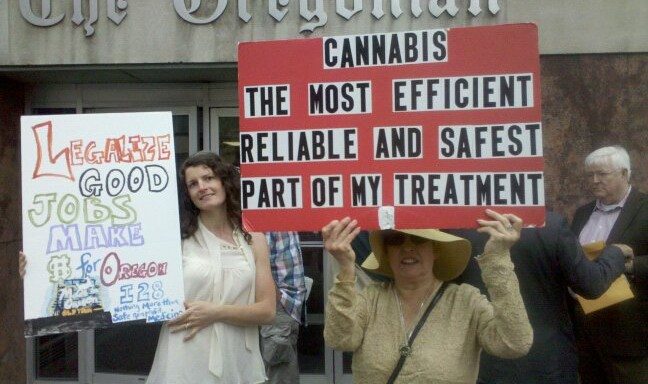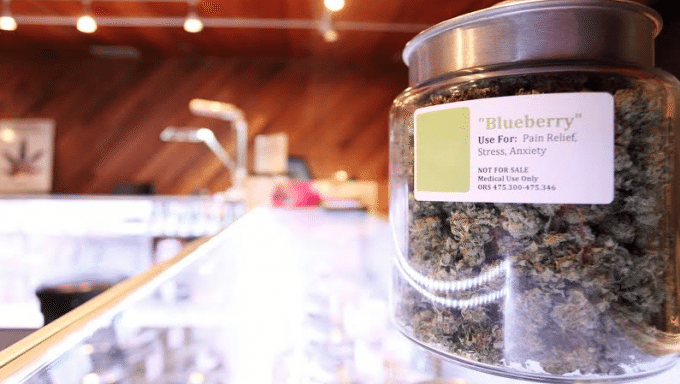
Prohibitionists, such as Project SAM’s Kevin Sabet, are fond of painting the burgeoning cannabis industry as “Big Marijuana,” an uncaring industry that only cares about making a buck. Sabet and others like to make the false comparison to Big Tobacco, accusing the marijuana business entrepreneurs of wanting to get younger and younger smokers addicted, health consequences be damned. These prohibitionists could not be more wrong, particularly about the vast number of cannabis industry participants. The Oregon cannabis industry ain’t Big Tobacco.

The cannabis industry across the nation, and particularly here in Oregon, is being built upon an existing medical marijuana movement that has been very caring and generous. The Oregon Medical Marijuana Act, passed in 1998, by a strong majority of voters, has allowed qualified patients to cultivate their own garden or have someone cultivate for them. Growers have been providing free medicine to thousands of patients and until dispensaries were legalized in 2013, no one has been able to legally make any kind of profit.
Now that marijuana has been legalized and more business people are looking to make a profit in the industry, many members of the industry are still cultivating freely for patients and many more are thinking of ways to help patients. Many dispensaries and businesses find unique ways to donate to patients in need. Knowing that supplying medical cannabis to low-income patients is a huge task, many in the cannabis industry support a low-income patient program that uses fees and/or taxes collected from non-patients to assist patients in need.
Herald and News‘ guest writer Debbie Vought erroneously calls Oregon’s cannabis industry the next Big Tobacco as she falsely claims that legal marijuana will lead to more child neglect and traffic accidents, along with fewer qualified workers. There hasn’t been any proof of marijuana legalization causing more child neglect cases, traffic accidents or hurting the economy. To the contrary, Colorado has seen a decrease in traffic fatalities since legalization took effect and the state’s economy is booming.
Imploring Klamath Falls, Oregon, to ban state-regulated marijuana businesses, Ms. Vought also states that legal cannabis will drastically increase social costs upon Oregon’s communities, far exceeding the new tax revenue generated. Ms. Vought’s claim is without merit as cannabis doesn’t have the same societal impacts as alcohol and tobacco.
Unfortunately, Ms. Vought uses the words of Justin Hartfield, the founder of WeedMaps, against the industry as The Wall Street Journal printed that Hartfield aimed to become the “Phillip Morris” of marijuana. Hartfield, it should be noted, earned his money in an ancillary business as WeedMaps, as The Wall Street Journal notes, is the “Yelp” of marijuana. Hartfield didn’t make his money off of the buying and selling of cannabis. Here’s what he told The Wall Street Journal:
“Philip Morris is not going to move in until it’s 100% legal for them to do so,” says Mr. Hartfield. “By that time, they’re going to buy me and then do it. And they’re going to do it right because I’m going to be the one leading the charge.”
While Hartfield was wrong to play into prohibitionists’ hands, he didn’t claim that the cannabis industry was trying to be like the Big Tobacco. The evidence on the ground is that the cannabis industry wants to work with state regulators to implement sensible regulations and keep marijuana out of the hands of kids, exactly the opposite of long-standing practices of Big Tobacco.

When we drafted Measure 91 to legalize and regulate marijuana in Oregon, we had the craft beer and winery models in mind. We purposefully kept barriers to entry low so small businesses to thrive. If you attend an event like the Oregon Marijuana Business Conference, you will see mostly mom-and-pop operations, not Big Tobacco-like business executives looking to trick kids. To the contrary, the cannabis community knows that kids getting their hands on marijuana could lead to a backlash against our industry, so we work as diligently as possible to implement good regulations and business practices to prevent such a backlash.
There have been some changes to the law that have gone against the intent of Measure 91, including the ability of localities like Klamath Falls to more easily ban state-regulated marijuana businesses. The notion by Ms Vought and other prohibitionists that they are helping their children and communities by banning state-regulated businesses is faulty because they are merely pushing marijuana into an unregulated system that doesn’t require testing or that anyone check identification. If you truly want to prevent substance abuse and keep marijuana out of the hands of minors, regulating marijuana and using the tax revenue for drug prevention programs and other social services, is a much better policy.






